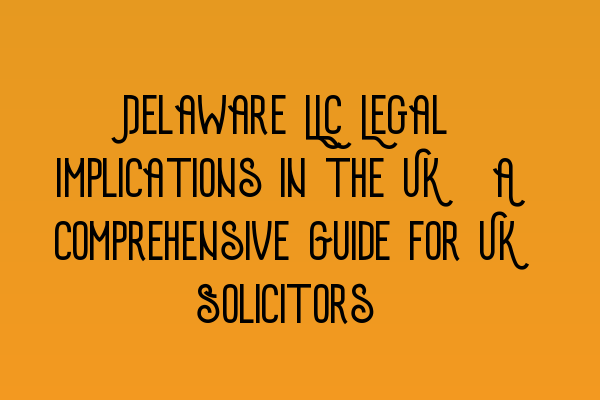Delaware LLC Legal Implications in the UK: A Comprehensive Guide for UK Solicitors
Welcome, UK solicitors, to this comprehensive guide on Delaware Limited Liability Companies (LLCs) and the legal implications they have in the United Kingdom. Whether you are assisting UK clients with Delaware LLC formation or dealing with cross-border business ventures, understanding the legal nuances and implications is crucial. In this guide, we will delve into the key aspects of Delaware LLCs, their formation, governance, taxation, and how they interact with UK law.
Formation of Delaware LLCs
Delaware is a popular choice for LLC formation due to its favorable business laws and flexible operating framework. The process of forming a Delaware LLC involves filing a Certificate of Formation with the Delaware Secretary of State, which requires basic information such as the LLC name, registered agent details, and purpose of the company. UK solicitors handling Delaware LLC formations for their clients should ensure compliance with both Delaware and UK regulatory requirements to avoid any potential legal pitfalls.
Governance and Management
Delaware LLCs offer significant flexibility in terms of governance and management structure. The LLC operating agreement, a contract among LLC members, outlines the rules and regulations for running the company. UK solicitors must guide their clients through the process of drafting an operating agreement that meets both Delaware and UK legal standards to ensure proper governance and protection for the LLC members. It is crucial to address issues such as decision-making, profit-sharing, and member rights in the agreement.
Taxation Considerations
Understanding the taxation implications is critical when advising clients on Delaware LLCs. Delaware itself does not impose corporate income tax on LLCs, but LLC members are responsible for paying taxes on their share of profits earned through the LLC. In the UK, however, LLCs are generally treated as transparent entities for tax purposes. UK solicitors must navigate the complex tax laws to ensure compliance and optimize tax efficiency for their clients.
Interaction with UK Law
When dealing with cross-border business activities involving Delaware LLCs, UK solicitors should carefully consider how UK law interacts with the Delaware legal framework. It is crucial to assess the implications of the Companies Act 2006, tax regulations, and other relevant UK legislation on Delaware LLCs operating in the UK. By doing so, solicitors can adequately advise their clients on the best practices for complying with both Delaware and UK legal requirements.
Conclusion
As UK solicitors, having a thorough understanding of Delaware LLCs and their legal implications is imperative for providing effective advice to clients. We have covered key aspects of Delaware LLC formation, governance, taxation considerations, and the interaction between Delaware and UK law. By staying up-to-date with relevant legal developments and seeking the assistance of experts in cross-border transactions, UK solicitors can navigate the complexities of Delaware LLCs and ensure legal compliance for their clients.
If you have any further questions or need assistance with preparing for the SQE exams, feel free to check out our related articles:

